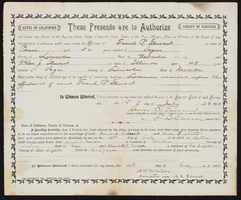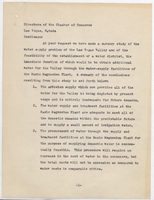Search the Special Collections and Archives Portal
Search Results
William Flangas Scrapbooks
Identifier
Abstract
The William Flangas Srapbooks document his anti-smoking efforts in Nevada from 1974 to 2014. These materials include correspondence, articles, copies of assembly bills, newsletters related to smoking and health, and newsletters related to non-smokers.
Archival Collection
Stella Champo Iaconis oral history interviews
Identifier
Abstract
Oral history interview with Stella Champo Iaconis conducted by Kay Long on May 14, 1997, May 21, 1997, May 26, 1997, and September 22, 1997 for the Women's Research Institute of Nevada (WRIN) Las Vegas Women Oral History Project. Iaconis opens her interviews discussing her difficult upbringing and life on a ranch in Las Vegas, Nevada with her dad in the 1910s and 1920s. Iaconis then describes her experiences as a waitress in Las Vegas. As the interviews continue, Iaconis discusses Block 16 and sex work, the Helldorado Days, and life in 1930s Las Vegas. Iaconis ends the interview talking about her father and his career as a miner; her many husbands; and her personal history in Las Vegas.
Archival Collection

Marie Antoinette Antonio oral history interview: transcript
Date
Archival Collection
Description
Oral history interview with Marie Antoinette Antonio conducted by Cecilia Winchell and Stefani Evans on December 4, 2021 for Reflections: The Las Vegas Asian American and Pacific Islander Oral History Project. Marie reflects on her upbringing in Cagayan de Oro, Philippines and her love of music that came from her mother. Marie talks about studying music in college and traveling with her husband to Guam to become a music teacher at a Catholic school before immigrating to San Jose, California. She shares the culture shock they faced adapting to life in the United States and the higher cost of living in California, which caused the couple to move to Las Vegas. Marie discusses her life in Las Vegas, traditions and cultural celebrations she partakes in, and the American Dream.
Text

Junior Fonotisatele oral history interview: transcript
Date
Archival Collection
Description
Oral history interview with Junior Fonotisatele conducted by Cecilia Winchell and Stefani Evans on November 10, 2021 for Reflections: The Las Vegas Asian American and Pacific Islander Oral History Project. Junior discusses his Samoan background and the importance of strong family values. He talks about his early years in Utah and California before moving to Las Vegas where he attended and graduated from the University of Nevada, Las Vegas. Junior shares his employment history as a bodyguard for Floyd Mayweather, an entrepreneur of a clothing brand, and an investor into a range of ventures including security, solar energy, and mental health. He concludes with a discussion of Samoan cultural celebrations, his religion, and the significance of his tattoos.
Text
Steve Sisolak (Nevada Governor) oral history interview conducted by Magdalena Martinez: transcript
Date
Archival Collection
Description
From the Lincy Institute "Perspectives from the COVID-19 Pandemic" Oral History Project (MS-01178) -- Elected official interviews file.
Text

Marriage certificate of Helen and Frank Stewart and Tiza Stewart land patents
Date
Archival Collection
Description
Marriage certificate of Helen and Frank Stewart and Tiza Stewart land patents
Text

Anita Tijerina Revilla oral history interview: transcript
Date
Archival Collection
Description
Oral history interview with Anita Tijerina Revilla conducted by Marcela Rodriguez-Campo on October 09, 2018 for the Latinx Voices of Southern Nevada Oral History Project. In this interview, Revilla discusses her early life in San Antonio, Texas. She talks about her decision to make education a priority, figuring out the college application process on her own, and her initial interest in social justice. Revilla talks about how her critical consciousness was developed, and her pedagogical approach to teaching. Revilla describes her role in the 2006 May Day march, advocating advocating for the queer community, and disrupting oppressive systems to increase educational access for students. Lastly, Revilla discusses ethnic studies and the history of inequality in the United States.
Text
Sondra Cosgrove (Vote Nevada) oral history interview conducted by Magalena Martinez and Elia Del Carmen Solano-Patricio: transcript
Date
Archival Collection
Description
From the Lincy Institute "Perspectives from the COVID-19 Pandemic" Oral History Project (MS-01178) -- Community organization interviews file.
Text

Sanje Sedera oral history interview: transcript
Date
Archival Collection
Description
Oral history interview with Sanje Sedera conducted by Kristel Peralta, Cecilia Winchell, Ayrton Yamaguchi, and Stefani Evans on April 16, 2021 for Reflections: The Las Vegas Asian American and Pacific Islander Oral History Project. Sanje Sedera discusses growing up in Sri Lanka, formerly Ceylon, with his family. He shares his educational history, moving from Sri Lanka to Darwin, Northern Territory, Australia as a high schooler to learn English before immigrating to the United States to attend Idaho State University. Sedera discusses the political unrest and civil war that took place in Sri Lanka between the Tamil and Sinhalese people, and how he grew to appreciate political activism instilled in him by his paternal grandparents. Sedera shares his employment history working as a manager for K-Mart, an opportunity that brought him to Las Vegas, as well as his entrepreneurial pursuits of owning a mortgage business and becoming a realtor. He talks about the financial crisis of 2008 that led to losing his business, his attempts to run for public office, and how he helped to form Nevada's Asian American Democratic Caucus. Sedera concludes with a discussion of his Buddhist practice and how these philosophies have shaped his life.
Text

Letter from Alfred J. Ryan to the Directors of the Las Vegas Chamber of Commerce, circa 1950
Date
Archival Collection
Description
Discussion of the feasibility of bringing water from Lake Mead to Las Vegas. Pittman is an older name for the city of Henderson. Whitney is an older name for East Las Vegas.
Text
